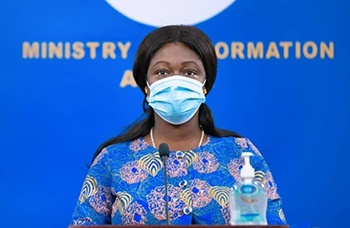The National Board for Small Scale Industries (NBSSI), has said that, one of the major goals of the GHȼ1 billion stimulus package, is to afford businesses the opportunity to retain their Human Resource as a means to help government reduce the number of layoffs that may ensue due to COVID-19 economic challenges.
According to the Executive Director of NBSSI, Esi Kosi Yankey Ayeh, the move is key and critical to the current times, as government would want the money to reinvigorate the economy; especially Micro, Small and Medium Enterprises, (MSMEs).
Speaking at the Ghana National Chamber of Commerce and Industry (GNCCI) COVID-19 Strategies for Business Survival and Growth Part 2; Mrs. Yankey Aryeh said, some great efforts have been put into developing the loan portfolio dubbed Anidaso and Adom (special) loans and therefore strict measure would be followed to ensure recipient use it to stimulate economic growth.
“Not all who apply will get the loan. We are therefore telling all business who apply to get the documentation right and when they are faced with any challenge they can talk to the chamber or call us to help fix it. We are also warning that due to the /suspected fraud we have waived all registration fees” Mrs. Yankey Ayeh told the GNCCI webinar.
Reiterating the application requirement, she said, an applicant (business), among others was expected to show proof of its membership to a recognised association, trade group or registration with the NBSSI as part of the eligibility criteria.
As part of the modalities, she said an applicant must also show verifiable evidence of business activities gravely impacted by the COVID-19 pandemic.
“An applicant must operate a registered business which falls under the MSME category, and must also have a tax identification number (TIN).
“An applicant must engage in a business that produces goods or service that supports the fight against COVID-19, or operate a business that was adversely impacted by the outbreak of the virus,” she said.
The CAP
The government announced the GH¢1 billion Coronavirus Alleviation Programme as part of enhanced measures to mitigate the impact of COVID-19 on households, contain disruption to economic activities and rescue and revitalise industries.The CAP, which was subsequently approved by Parliament on April 9, 2020, voted GH¢600 million as soft loans for businesses, especially those in the MSMEs sector.
As a result, Mrs Yankey Ayeh indicated that the fund had been categorised in Anidaso and Adom (special) loans, and was expected to provide soft loans at three per cent interest rate to businesses under the MSME space:“After deliberation by the President, the Ministry of Finance and the Ministry of Trade and Industry, we decided to keep the interest rates at three per cent to reduce the plight of the MSMEs in this difficult time.
“The moratorium still remains up to one year and during the application process, MSMEs have the option to select a moratorium that will work best for them. Repayment of loans also remains two to three years; this was taken into consideration based on MSMEs’ needs assessment,” she added.
GNCCI
The President of GNCCI, Nana Dr. Appiagyei Dankawoso I said, this is the time for businesses to develop an intelligent working capital cycle to address issues of input supplies, production capacity, employee management, among others.

He wants government to also focus on developing industry-specific stimulus package to complement the efforts of businesses in their bid to survive and grow. This, he believes will ultimately achieve impact, resilience, and sustainability of the entire industrial value chains, given the disruptions caused by COVID-19.
“Last week, government launched the GHS600 million stimulus package for SMEs and I am also aware that plans have been made to activate the GHS3 billion syndicated loan for the large enterprises which is very welcoming.
Let me once again thank the government and its institutions and agencies for their proactive measures taken to curb the spread of COVID-19. I also commend private institutions and individuals for their voluntary contributions to the National COVID-19 Trust Fund” he said.
He added that: “In spite of the hardships inflicted on the Ghanaian economy by the COVID-19 pandemic and its associated restrictions, it has also presented us with a unique opportunity to address the structure of the Ghanaian economy from an import-dependent to an export-led economy. The current merchandised export structure, dominated by raw and unprocessed commodities will not give us the sustainable and inclusive economy required to move Ghana from a lower to upper middle-income economy.
The appropriate time to structurally transform Ghana’s economy through industrialization is now. This will require a collaborative effort between government and the private sector to enhance local production for import substitution and export. It is my expectation that our seasoned panelists will bring their experiences to bear, in guiding businesses to choose the right mix of financing options necessary to sustain their businesses during and after this pandemic.”










